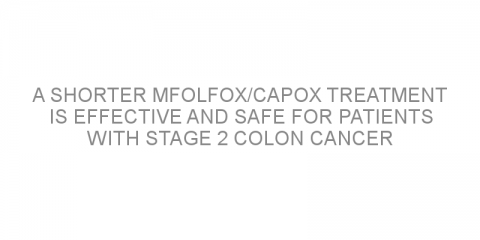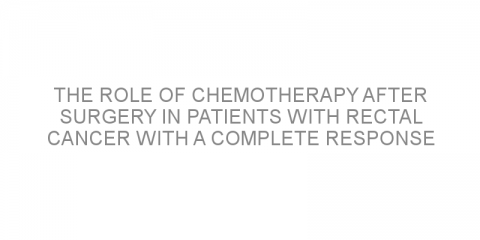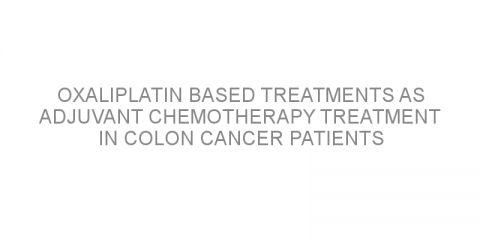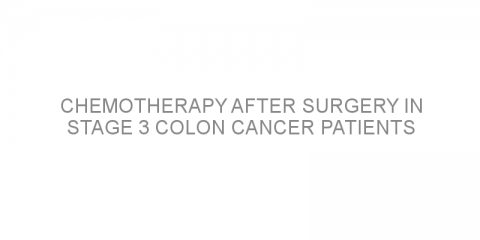In a nutshell The aim of this study was to evaluate the impact of adding oxaliplatin (Eloxatin) to the chemotherapy regimen tegafur uracil (UFT)/leucovorin (LV; folinic acid) for patients that had surgery for colorectal cancer (CRC). The study found that the addition of oxaliplatin to UFT/LV improved patient outcomes. Some background CRC can...
Read MoreTreatment(s) already received-Surgery Posts on Medivizor
Can reducing chemotherapy duration from 6 to 3 months reduce side effects in patients with colorectal cancer and still be effective?
In a nutshell This study investigated if reducing therapy duration could reduce side effects in patients but still be effective in patients with stage II colorectal cancer (CRC). This study showed that in certain patients a 3-month treatment duration can be considered. Some background Patients with colorectal cancer (CRC) can be treated...
Read MoreA shorter mFOLFOX/CAPOX treatment is effective and safe for patients with stage 2 colon cancer
In a nutshell This study compared 3 and 6 months of oxaliplatin (Eloxatin)-based chemotherapy in stage 2 colon cancer. Researchers suggested that the 3-month treatment might be a good and safer option for these patients. Some background Colorectal cancer is the third most common cancer diagnosed in both men and women in the US. Chemotherapy after...
Read MoreAre intense follow-up programs beneficial for patients with colorectal cancer?
In a nutshell This study reviewed the effect of follow-up programs on the survival of patients with colorectal cancer. Researchers suggested that intense follow-up programs do not improve the survival of these patients. Some background Colorectal cancer is a commonly diagnosed cancer in the US. Two in three patients will present with the possibly...
Read MoreOxaliplatin in the treatment of rectal cancer after surgery
In a nutshell This study investigated the role of oxaliplatin (Eloxatin) in treating patients with rectal cancer after surgery. Researchers suggested that this drug may be a good option in the treatment of rectal cancer. Some background Chemotherapy is one of the standard treatments for rectal cancer. It usually consists of...
Read MoreSurgery followed by chemotherapy improves the outcomes of patients with rectal cancer
In a nutshell This study investigated the effectiveness of surgery followed by chemotherapy without chemoradiotherapy (CRT) before surgery to treat rectal cancer. Researchers suggested that this treatment improves the outcomes of these patients. Some background Colorectal cancer is the third most common cancer worldwide. The standard...
Read MoreThe role of chemotherapy after surgery in patients with rectal cancer with a complete response after pre-surgery treatment
In a nutshell This study investigated the impact of chemotherapy after surgery (CAS) in patients with rectal cancer who had a complete response to chemotherapy before surgery. Researchers suggested that the routine use of CAS should not be recommended in these patients. Some background Colorectal cancer is one of the most common cancer...
Read MoreLooking for participants with metastatic colorectal cancer to try a new treatment combination
In a nutshell This trial is comparing the effectiveness and toxicity of ABT-165 or bevacizumab (Avastin) plus FOLFIRI (irinotecan, leucovorin, fluorouracil) chemotherapy in patients with metastatic (spread to other parts of the body) colorectal cancer. The main outcome to be measured will be tumor response and survival without cancer...
Read MoreSearching for patients to test a new treatment for unresponsive multiple myeloma.
In a nutshell This trial is comparing the effectiveness of a new therapy, bb2121, to commonly used combinations of drugs for relapsing/refractory (unresponsive) multiple myeloma (RRMM). The main outcome to be measured is the time from the start of treatment until cancer worsens. The details Many patients are cured with standard treatments, such as...
Read MoreDoes chemotherapy after surgery improve survival in older patients with colon cancer?
In a nutshell This study investigated the use of chemotherapy after surgery in elderly patients with stage 2 and 3 colon cancer. Researchers suggested that chemotherapy after surgery improves outcomes in patients with stage 3 colon cancer. Some background Life expectancy in the Western countries has increased. Colorectal cancer is diagnosed most...
Read MoreOxaliplatin based treatments as adjuvant chemotherapy treatment in colon cancer patients
In a nutshell This study investigated the effectiveness of a 3-month oxaliplatin-based chemotherapy treatment after surgery in patients with stage 3 colon cancer. Researchers suggested 6-months of treatment is associated with better outcomes. Some background The current standard treatment for stage 3 colon cancer patients is surgery followed by...
Read MoreChemotherapy after surgery in stage 3 colon cancer patients
In a nutshell This study investigated the optimal time to start chemotherapy after colon surgery. Researchers suggested that patients should start chemotherapy within 8 weeks after surgery. Some background The recommended treatment for stage 3 colon cancer is surgery followed by chemotherapy. This reduces the risk of recurrence (when the cancer comes...
Read More












